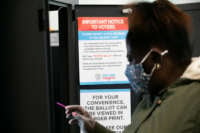
Many events marking the first anniversary of the deadly January 6 insurrection at the U.S. Capitol are focusing on voting rights, as false claims about voter fraud have fueled Republican efforts to restrict voting access, especially for Black voters. Senate Majority Leader Chuck Schumer vowed Tuesday to proceed with a vote to change the filibuster rule to prevent Republicans from blocking new voting rights legislation. Professor Carol Anderson, author of White Rage and One Person, No Vote, says former President Trump’s false claims about voter fraud prompted a wave in 2021 of some of the most aggressive and racist assaults on voting rights in recent U.S. history. “It is Jim Crow 2.0,” Anderson says of Republican voter suppression waged through state legislation. “It is designed to make sure we have minority rule in the United States, that we don’t have a democracy.”
TRANSCRIPT
This is a rush transcript. Copy may not be in its final form.
AMY GOODMAN: This is Democracy Now!, democracynow.org, The War and Peace Report. I’m Amy Goodman.
More than 200 vigils and events across the United States today will mark the first anniversary of the deadly January 6 insurrection at the Capitol, when a largely white mob of Trump supporters tried to stop the certification of the 2020 presidential election and subvert democracy. Many of today’s events will focus on voting rights, as former President Trump’s false claims about voter fraud have fueled Republican efforts to restrict voting access. Senate Majority Leader Chuck Schumer vowed Tuesday to proceed with a vote to change the filibuster rule to prevent Republicans from blocking new voting rights legislation.
MAJORITY LEADER CHUCK SCHUMER: There is no better way to heal the damage of January 6th than to act so that our constitutional order is preserved for the future. If we do not act to protect our elections, the horrors of January 6th will risk becoming not the exception but the norm. The stakes could not be higher, so we are going to move forward.
AMY GOODMAN: But Democratic leadership may lack the votes needed. On Tuesday, Democratic Senator Joe Manchin voiced skepticism about changing the filibuster rules.
SEN. JOE MANCHIN: Let me just say, to being open to a rules change that would create a nuclear option, it’s very, very difficult. That’s a heavy lift.
AMY GOODMAN: For more, we go to Atlanta, Georgia, to speak with Carol Anderson, professor at Emory University, author of One Person, No Vote: How Voter Suppression Is Destroying Our Democracy and White Rage: The Unspoken Truth of Our Racial Divide.
Welcome back to Democracy Now!, Professor Anderson. Can you talk about what you think is at the root of Trump’s big lie about the election? It was a year ago today, January 6, not only the deadly insurrection — and maybe these are linked — but that a Black man, Reverend Raphael Warnock, and a Jewish man, Jon Ossoff, had just won the two Senate seats in Georgia.
CAROL ANDERSON: Yes. And so, for me, what is at the root of this is the delegitimization of Black voters, the delegitimization of African Americans as citizens who have the right to vote. And we heard that in November and December, when you kept hearing about the big lie. And you heard Newt Gingrich talking about: “They stole the election in Philadelphia. They stole the election in Milwaukee. They stole the election in Atlanta.” Notice that he identified cities that have sizable Black populations, and linking those cities with the theft, with the theft of democracy, with the theft of this election, stealing it from good, honest, hard-working white folk. That was the subtext that led to the insurrection: the delegitimization of African Americans as citizens, as voters.
AMY GOODMAN: And so, if you can talk about what was at the root of what was happening a year ago, the certifying of the national election? But also, it was not only about Biden. At this point a year ago, by the afternoon, it was very clear that the Senate would be Democrat. And you had this group of white supremacists, of right-wing extremists, one carrying a Confederate flag, marauding through the Capitol. Talk about the connection between those two and what you think has to happen now.
CAROL ANDERSON: And so, the connection really is the assault on American democracy via what I call this bureaucratic violence of voter suppression. And what we saw in the 2020 election and in the 2021 runoff here in Georgia, the Senate runoff, was that you had this massive voter turnout by Democrats, by African Americans, by Asian Americans, by Latinos, by Indigenous people, who were voting for the Democrats. And that flipped the — that flipped the White House, and it flipped the Senate. And that flipping of the Senate to blue, that is what made the election, in the eyes of the white supremacists, in the eyes of the white nationalists, illegitimate.
So, when you have Mo Brooks, out of Alabama, talking about, “If you only count the legal votes, then Trump is the winner,” so that means that the illegal votes are those for African Americans — are those coming from African Americans, are those votes coming from Latinos, are those votes coming from Native Americans, are those votes coming from Asian Americans. It’s saying that the only real Americans are white Americans, white conservative Americans. Those are the only real Americans. That is what is at the foundation of this assault. That is why you saw the Confederate flag being hauled up in the Capitol, something that Robert E. Lee wasn’t even able to do.
AMY GOODMAN: Professor Anderson, your fellow Georgian, the oldest-ever living president, Jimmy Carter, just wrote an op-ed in The New York Times today, saying, “Our great nation now teeters on the brink of a widening abyss. Without immediate action, we are at genuine risk of civil conflict and losing our precious democracy.”
So, as we look back, let’s also look forward to the 2024 election. There are 200 vigils that are being held today across the country about voting rights. You have this, well, some call him senator, some call him “the other President Joe” — that’s Joe Manchin — questioning whether he would change the filibuster rules. Talk about how filibuster links to voting and what the wave of voting suppression laws has — what has to be done about them.
CAROL ANDERSON: And what really has to be done is that what we saw in the face of the big lie was that you had a number of states, including Georgia, that passed these voter suppression laws, that figured out how did African Americans, how did Latinos, how did Asian Americans, how did young folk, how did poor folk access the ballot box, and figure out a way how to shut that access down or to make it much more difficult. And you also had laws lowering the guardrails that protected this democracy from Trump being able to overturn the will of the voters. And so, that two-pronged attack is what is happening right now in our state laws.
We need federal legislation to come in and protect the rights of American citizens to vote. That is the Freedom to Vote Act, and that is the John Lewis Voting Rights Advancement Act. We need both of those in place. But we’ve got this filibuster thing that says that you need to have 60 votes in order to even discuss this thing, to discuss protecting American democracy, to protect voting rights for American citizens. We need to have those laws passed so that we can have a free and fair election in 2024. The election is being rigged right in front of our very eyes. The ways to stop American citizens from voting, it is Jim Crow 2.0. It is designed to ensure that we have minority rule in the United States, that we don’t have a democracy. It is a way to subvert having a fully vibrant, multiracial, multiethnic, multireligious democracy. That is what’s on the table. That’s why the filibuster that is blocking federal voting rights legislation has to be stopped. Joe Manchin is wrong.
AMY GOODMAN: I wanted to go to former Trump trade adviser Peter Navarro, who was speaking with Ari Melber on MSNBC and outlined his support for what he called the Green Bay sweep, a plan to overturn the election results in six states, including yours.
PETER NAVARRO: The plan was simply this: We had over a hundred congressmen and senators on Capitol Hill ready to implement the sweep. The sweep was simply that. We were going to challenge the results of the election in the six battleground states. They were Michigan, Pennsylvania, Georgia, Wisconsin, Nevada.
ARI MELBER: Do you realize you are describing a coup?
PETER NAVARRO: No. I totally reject many of your premises there.
AMY GOODMAN: So, that was Peter Navarro, Professor Anderson. And he included Georgia in that. And, of course, President Trump was putting enormous pressure on your Republican secretary of state to find the 11,000-plus votes, and the Republicans resisted. Today there’s no Republican leadership at the ceremonies at the Capitol. Your thoughts?
CAROL ANDERSON: And it begins to tell you. So, right after the insurrection, the invasion of the Capitol, you had Republicans coming out being appalled, being aghast. But that flipped relatively quickly, and you saw this loyalty to Trump being the defining characteristic of being a Republican: You are loyal to Trump; you are loyal to overthrowing the will of the voters.
And you saw here in Georgia, when Brad Raffensperger and Brian Kemp basically refused to bend to Trump’s will, how they have become anathema, so that Raffensperger lost the — the new law, legislation, here has removed his power on the state election board. And you saw there were billboards up defining Kemp and Raffensperger as enemies, as enemies of democracy, because they did not abide by Trump’s will. That is where we are right now, where we have a party that is loyal to a man and not loyal to the country, not loyal to American democracy, not loyal to the United States of America.
AMY GOODMAN: Finally, would you call President Trump racist? Would you call the voter suppression laws that are being enacted around the country straightforward racist?
CAROL ANDERSON: Trump is racist. Trump gained his political power on birtherism, which was denying the legitimacy of Barack Obama, a Black man.
And the laws that are being passed, they are as subtle and as vicious as the Jim Crow laws that came up in the 1890s and the early 20th century. They don’t say, “We don’t want Black folks to vote,” but the laws are written in ways that use the characteristics, the socioeconomic characteristics, of African Americans to stop and block African Americans from being able to vote. So, if you thought those Jim Crow laws were racist, then the ones that we are dealing with right now are equally racist.
AMY GOODMAN: Carol Anderson, professor at Emory University, author of the new book The Second: Race and Guns in a Fatally Unequal America, also author of One Person, No Vote: How Voter Suppression Is Destroying Our Democracy and White Rage: The Unspoken Truth of Our Racial Divide.
Next up, we look at the lead-up to the insurrection and what followed with Newsweek’s William Arkin. Stay with us.
This post was originally published on Latest – Truthout.



 (@mtgreenee)
(@mtgreenee) 
















 Guide (@IndivisibleTeam)
Guide (@IndivisibleTeam) 







